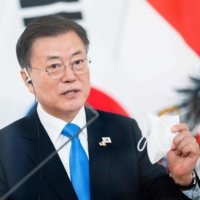With overtures on the sidelines of the Group of Seven summit reportedly spurned and denials that a meeting is planned during the Olympics, Tokyo and Seoul appear unlikely to repair their soured ties any time soon.
Relations between the neighbors faltered yet again Tuesday as Japan’s top government spokesman denied a media report that South Korean President Moon Jae-in was arranging a trip to Tokyo for the Olympics and talks with Prime Minister Yoshihide Suga.
The widely read Yomiuri daily reported earlier in the day that Moon’s administration had been coordinating with the Japanese government on the visit, and that Tokyo had been receptive to the idea.
“There is no truth to that report,” Chief Cabinet Secretary Katsunobu Kato told a news conference, declining to comment further.
The news came a day after Seoul criticized Tokyo for reportedly canceling a previously agreed to meeting on the sidelines of the G7 summit over the weekend, which Moon had been invited to attend.
That claim, which was also vehemently denied by Kato, would have been the first in-person meeting between Suga and Moon.
Relations between Japan and South Korea, both key U.S. allies in Asia, have plummeted over the issues of wartime labor and “comfort women,” a euphemism for those who suffered under Japan’s military brothel system before and during World War II.
Further complicating those fraught ties, South Korea’s military on Tuesday also kicked off annual drills around the powder-keg Takeshima islets, a small group of islands in the Sea of Japan — called the East Sea by South Korea — that are claimed by Japan but controlled by Seoul.
Citing an unidentified official from South Korea’s Foreign Ministry, the Yonhap news agency said the twice-a-year exercises around Takeshima, called Dokdo in South Korea, were the reason Suga had called off the weekend meeting with Moon. Kato, however, said Monday that a meeting had not been held due to scheduling issues.
Speaking at Tuesday’s news conference, Kato called the South Korean exercises “unacceptable and extremely regrettable,” reiterating Japan’s position that the islets are “clearly Japanese territory.”
Observers say Moon has stepped up his attempts at reconciliation in recent months, and South Korea’s Hankyoreh newspaper reported that he had hoped to use the anticipated brief meeting on the G7 sidelines to convey to Suga his intention to attend the Tokyo Games, scheduled to begin July 23, and kick-start their stalled relationship.
Instead, the two merely exchanged simple greetings during the summit.
“My first encounter with Prime Minister Suga was a precious chance that could have been a new start in the South Korea-Japan relationship, but I am sorry that it could not develop into a meeting,” Moon wrote afterward in a Facebook post.
Despite a handful of recent court rulings that have favored Japan’s position in wartime labor and comfort women cases, Tokyo has been cautious about reaching out to South Korea, skeptical that tensions between the two neighboring countries could ease anytime soon.
Tokyo says its 1965 pact to normalize ties with Seoul settled all post-colonial compensation issues, including those covering comfort women and wartime labor.
In addition, Moon will leave office in May next year, causing him to be seen by many as a lame-duck president, while Suga will face both a Liberal Democratic Party presidential election and a general election in the coming months.
“Domestic circumstances in both countries make it difficult for either government to really move, although we’re seeing a lot of flexibility on the South Korean side, maybe to a surprising extent,” Tobias Harris, a Japan expert and senior fellow for Asia at the Center for American Progress, told an online panel Tuesday.
Still, others say Suga could have used the G7 meeting, where he maintained a relatively low profile, to score a breakthrough with Moon — and bolster his diplomatic chops.
“The failure of the two sides to actually meet at the G7 was a tremendous lost opportunity for Suga,” Shihoko Goto, a senior associate for Northeast Asia at the Wilson Center think tank, told the same panel. “He really could have seized that moment and played the global statesman, not simply looking at the very narrowly focused LDP interest but really trying to think of Japan as a global stabilizer.”
Staff writer Satoshi Sugiyama contributed to this report.
In a time of both misinformation and too much information, quality journalism is more crucial than ever.
By subscribing, you can help us get the story right.
SUBSCRIBE NOW




